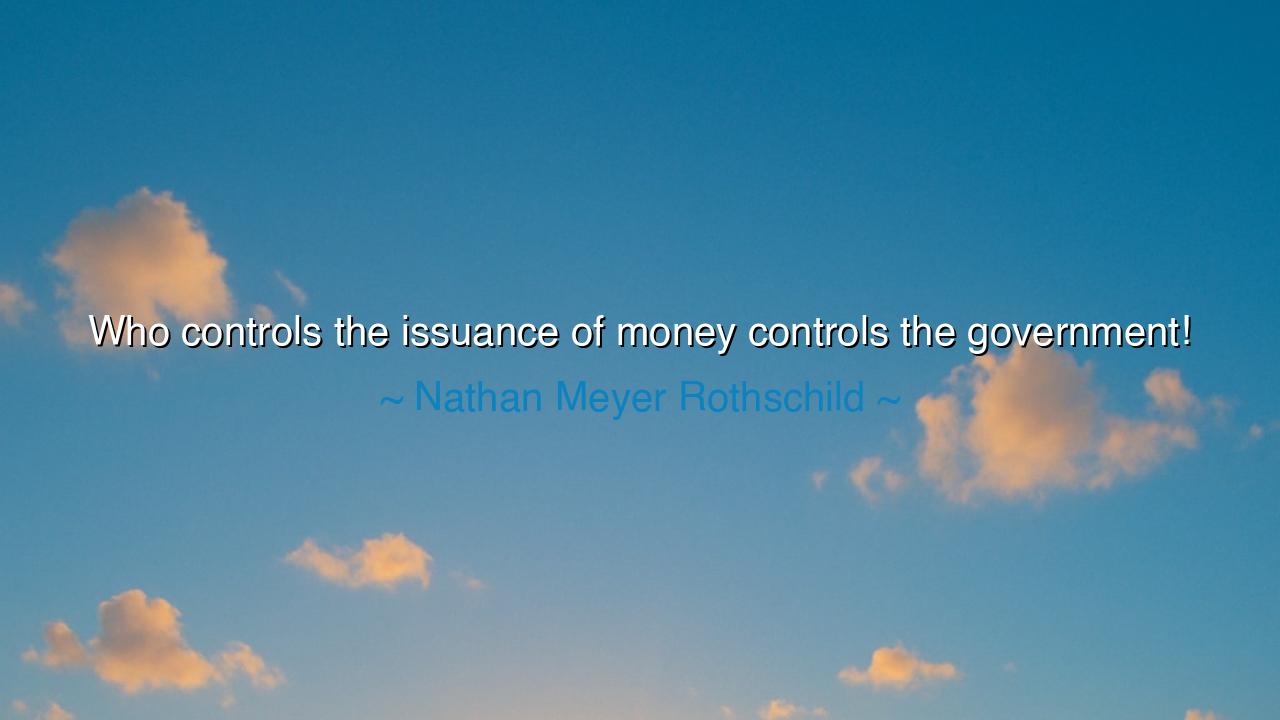
Who controls the issuance of money controls the government!






In the grand theater of nations, where kings rule and parliaments debate, there exists a force both invisible and supreme — the lifeblood of commerce, the pulse of civilization: money. And it was Nathan Meyer Rothschild, the great banker of Europe’s nineteenth century, who spoke the truth that most dared not utter: “Who controls the issuance of money controls the government!” These words, heavy as iron and sharp as truth, reveal a power older than empires and more enduring than armies — the power over credit, over currency, over the very trust by which men trade and nations live.
Rothschild was no philosopher in an ivory tower. He was a man of the marketplace, a titan who rose from modest beginnings to become the financial pillar of Europe. His family’s network of banks spanned continents, financing wars and rebuilding nations. He understood, as few others did, that the ability to create and issue money — not merely to possess it — is the root of all political power. Governments may pass laws and raise armies, but they cannot act without funds. Thus, those who control the flow of money hold the strings that move the state itself. The throne, the senate, the crown — all must bend before the silent might of finance.
The origin of this insight lies deep in history. In ancient times, rulers minted coins of gold and silver, and the power to coin money was seen as divine. When Julius Caesar reformed Rome’s monetary system, he also reformed its destiny, binding the republic’s strength to his own. Centuries later, kings who overspent in war turned to bankers for salvation — and in doing so, became their servants. The monarch may wear the crown, but the banker holds the key to his treasury. Thus, Rothschild’s words were not a boast, but an observation carved from the fabric of history: that whoever commands the credit of the nation commands its fate.
Consider the tale of King George III and the American colonies. When the colonies rebelled, their victory depended not only on muskets and courage but on money — money to pay soldiers, to buy arms, to sustain the fight for freedom. Lacking gold, they turned to printed notes — paper money, issued by their own hands. In that moment, the colonies seized both their political and their financial independence. For they knew, as Rothschild later declared, that to control their own issuance of money was to control their own destiny. A nation that depends on others for its currency becomes a vassal, no matter its flag or anthem.
But there is a darker lesson as well. History shows that when the creation of money is divorced from morality, when issuance is governed by greed instead of principle, the people suffer. The Weimar Republic, born from the ashes of World War I, learned this bitter truth when it printed money without restraint. Prices soared, savings vanished, and citizens carried wheelbarrows of worthless bills. The nation collapsed not from invasion, but from the corruption of its own monetary soul. Thus, control over money is not merely power — it is responsibility, and when misused, it devours the very civilization it sustains.
Rothschild’s warning still echoes in the modern world, though many pretend not to hear it. Central banks, currency markets, and financial institutions have replaced royal mints, yet the truth remains unchanged. Those who decide how money is created — whether through lending, printing, or digital decree — hold the fate of nations in their hands. And when governments become beholden to these forces, democracy itself stands on fragile ground. A people who do not understand where their money comes from are like a farmer who drinks from a poisoned well — they may live today, but they will perish tomorrow.
The lesson, then, is not to despise wealth, but to understand it. A free people must never surrender their right to question the issuance of money, for it is the foundation of all freedom. To participate blindly in systems of debt and interest without knowing who profits is to be ruled in ignorance. Learn where your money goes; learn who controls its creation. Support transparency, demand accountability, and hold your leaders to the sacred duty of stewardship. For no constitution, no law, no election can stand long if the economic heart of the nation beats under another’s command.
So, my child of the republic, remember Rothschild’s ancient truth: money is not mere coin or paper — it is the language of power. And whoever writes that language writes the fate of empires. Guard it well. Let not the control of your nation’s wealth slip into unseen hands. For when the people awaken to this knowledge — when they claim both their political and their financial sovereignty — then, and only then, will they truly govern themselves.






AAdministratorAdministrator
Welcome, honored guests. Please leave a comment, we will respond soon